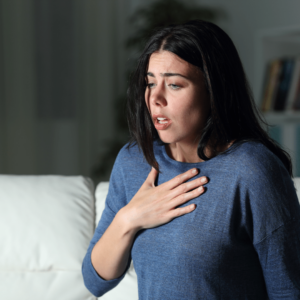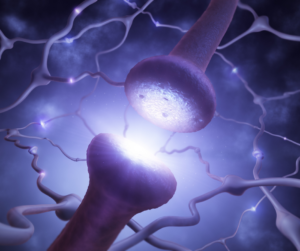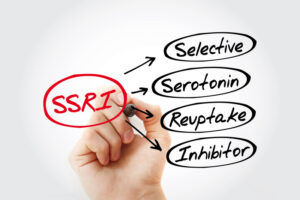Over half the people who struggle with addiction also have a co-occurring mental health disorder. Some of the most common co-occurring disorders seen with substance abuse are generalized anxiety disorder, eating disorders, bi-polar, post-traumatic stress disorder; and personality disorders like borderline, antisocial, schizophrenia, and attention deficit disorder.
The overall prevalence of personality disorders (or other mental health disorders) is significantly lower in the normal population than it is for individuals treated for a substance use disorder. In other words, if you struggle with addiction, you are more likely to have a co-occurring mental health disorder.
For instance, opioid use disorder commonly co-occurs with major depressive disorder or post-traumatic stress disorder (Osilla, et al., 2022) and alcohol abuse is common among individuals who struggle with anxiety and depression. Often people in treatment for addiction never receive the proper help for their mental health disorder, or vice versa.
 For instance, as I’ve shared in other posts, I began ‘self-medicating’ my anxiety disorder with alcohol when I was fourteen. Trauma induced mental health problems, genetics, or chemical imbalances in our brains can cause individuals to self-medicate with substances at an early age, or any age for that matter. If you think about it, it’s a normal reaction in many ways. A person is trying to fix what is wrong in their body and brain. This is why reducing the stigma of addiction is so important since there are many medical, therapeutic, and spiritual techniques that can help individuals achieve the brain body balance they were most likely looking for when they began to self-medicate.
For instance, as I’ve shared in other posts, I began ‘self-medicating’ my anxiety disorder with alcohol when I was fourteen. Trauma induced mental health problems, genetics, or chemical imbalances in our brains can cause individuals to self-medicate with substances at an early age, or any age for that matter. If you think about it, it’s a normal reaction in many ways. A person is trying to fix what is wrong in their body and brain. This is why reducing the stigma of addiction is so important since there are many medical, therapeutic, and spiritual techniques that can help individuals achieve the brain body balance they were most likely looking for when they began to self-medicate.
The obvious reason self-medicating a mental health condition, mood disorder, or personality disorder is dangerous is because it often leads to addiction. The other not so obvious reason is that in the long run, self-medicating often achieves the opposite effect the person was trying to treat.
If we stay with the alcohol to treat anxiety analogy, here is what happens. GABA is an inhibitory neurotransmitter in our brain.  Basically, it is there to calm us down so we are not overwhelmed by incoming stimuli. Alcohol stimulates GABA receptors in our brain which is why it makes us feel relaxed. When someone drinks alcohol, their brain adapts by reducing GABA production. This means when they stop drinking there is now a GABA shortage, and anxiety symptoms worsen. Similar things happen in the brain with other drugs like cocaine and methamphetamines which stimulate dopamine and other feel-good endorphins. People may use these drugs to treat depression. Once they quit taking the drug there is a depletion of these chemicals, making the user feel even more depressed prior to use. Now they need the substance just to feel normal.
Basically, it is there to calm us down so we are not overwhelmed by incoming stimuli. Alcohol stimulates GABA receptors in our brain which is why it makes us feel relaxed. When someone drinks alcohol, their brain adapts by reducing GABA production. This means when they stop drinking there is now a GABA shortage, and anxiety symptoms worsen. Similar things happen in the brain with other drugs like cocaine and methamphetamines which stimulate dopamine and other feel-good endorphins. People may use these drugs to treat depression. Once they quit taking the drug there is a depletion of these chemicals, making the user feel even more depressed prior to use. Now they need the substance just to feel normal.
 Here is what is so interesting, there are many medications and SSRI’S to help treat anxiety and depression and of course other drugs that treat different mental health conditions. Many of these medications actually work on the same receptors or chemicals in our brain (albeit on a much more controlled and healthy level) to achieve the balance we were looking for when we began to self-medicate. Sadly, often times there is a stigma around these types of medications too. I’ll often hear people struggling with an addiction say they don’t like pills or they’re not a ‘pill popper.’ The person may feel a sense of shame around their addiction and accepting that they may have an underlying mental health problem may add to those shameful feelings. The heartbreaking part of this is that often times pain, trauma, chaos, abuse or neglect is what led to the shameful feelings and mental health challenges in the first place. Usually, these events occurred through no fault of their own. Unfortunately, the addicted lifestyle can be very traumatic too, which then compounds the traumatic experiences and feelings of shame and isolation.
Here is what is so interesting, there are many medications and SSRI’S to help treat anxiety and depression and of course other drugs that treat different mental health conditions. Many of these medications actually work on the same receptors or chemicals in our brain (albeit on a much more controlled and healthy level) to achieve the balance we were looking for when we began to self-medicate. Sadly, often times there is a stigma around these types of medications too. I’ll often hear people struggling with an addiction say they don’t like pills or they’re not a ‘pill popper.’ The person may feel a sense of shame around their addiction and accepting that they may have an underlying mental health problem may add to those shameful feelings. The heartbreaking part of this is that often times pain, trauma, chaos, abuse or neglect is what led to the shameful feelings and mental health challenges in the first place. Usually, these events occurred through no fault of their own. Unfortunately, the addicted lifestyle can be very traumatic too, which then compounds the traumatic experiences and feelings of shame and isolation.
 This is why it is so important for individuals struggling with an addiction to reach out for help. There are thousands of people who have been there and can help them remove the addictive substance while helping them work on the underlying mental health issues. At The Life Change Center, we treat heroin and pill addiction and we can help you recover or refer you to those who can.
This is why it is so important for individuals struggling with an addiction to reach out for help. There are thousands of people who have been there and can help them remove the addictive substance while helping them work on the underlying mental health issues. At The Life Change Center, we treat heroin and pill addiction and we can help you recover or refer you to those who can.
Remember that almost everyone needs some help and support at some point in their lives and you are not alone.
Osilla, K. C., Dopp, A. R., Watkins, K. E., Ceballos, V., Hurley, B., Meredith, L. S., Leamon, I., Jacobsohn, V., & Komaromy, M. (2022). Collaboration Leading to Addiction Treatment and Recovery from Other Stresses (CLARO): process of adapting collaborative care for co-occurring opioid use and mental disorders. Addiction science & clinical practice, 17(1), 25. https://doi.org/10.1186/s13722-022-00302-9
